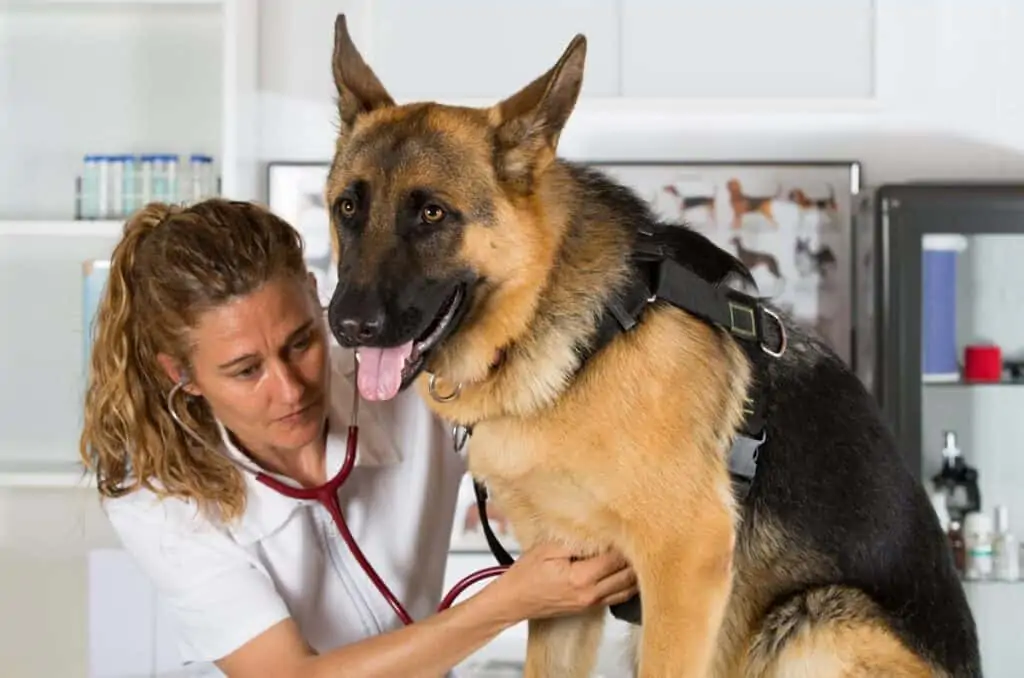Why Does My Dog Keep Gagging?
If your dog is gagging, you may understandably be concerned. There are many reasons your dog might be gagging, and the situation may warrant veterinary intervention. In this article, you will learn some common reasons that cause dogs to gag excessively.

Should You Be Concerned?
When does gagging warrant seeing a vet? All dogs can gag occasionally. However, if your dog is gagging persistently and repeatedly over an extended period, or if your dog seems to be gagging excessively (more than you have ever seen before), that might point to a more severe problem.
On the other hand, if your dog gags once in a while after drinking, they might have consumed too much water at once. Alternatively, if they gag and vomit, that’s natural as well. When I refer to gagging in this article, I am talking about gagging without vomiting.
Keep in mind that your dog may gag and cough at the same time. Dogs might cough and then gag, or gag first and then cough. The order matters, so make sure to mention which one came first to the vet. It will help them accurately diagnose the problem.
For example, if your dog coughs first before gagging, they might have a lower respiratory tract infection.
Why Your Dog Keeps On Gagging
If your dog doesn’t stop gagging, it can be due to any of the following reasons.

There Is Something Stuck in Their Throat
This problem is pretty standard. Your dog might have swallowed a small toy, stick, rock, or bone, and it got stuck in their throat or esophagus. If your dog seems to be choking, take them to a vet as soon as possible so that they can dislodge the foreign object.
They Are Breathing in Too Much Smoke or Dust
There may be a problem in the environment that can explain the gagging. If you often smoke inside the house or burn wood in a fireplace, and the dog gags when you do that, it may be due to the smoke. Also, if there is a lot of dust in the house, such as if you are doing woodwork, that might cause irritation and gagging as well.
They Have Kennel Cough
Kennel Cough is a type of respiratory infection that can cause your dog to cough and gag. Usually, they will cough first, with the gagging coming after. Kennel cough, or canine infectious respiratory disease, is highly contagious, so many dogs get it.
Various types of bacteria can cause Kennel Cough, and the cough often sounds like a goose honk. Gagging can come from inflammation and mucus production.
They Have Sinusitis
Sinusitis is a common sinus infection that can cause your dog to gag. It causes postnasal drip, leading to gagging.
They Have Rhinitis
Rhinitis is a nasal infection that also causes postnasal drip. Like sinusitis, it is prevalent, and it can cause irritation and gagging.

They Have Laryngeal Paralysis
Laryngeal paralysis is a problem that affects Labrador Retrievers and Irish Setters as they get older. With laryngeal paralysis, the dog’s larynx doesn’t close properly, so food and drink can get in the airway in small amounts. It can also prevent them from taking deep breaths when needed.
If your dog has laryngeal paralysis, they may gag first and then cough. You might not notice its early signs, but laryngeal paralysis often gets worse with time. If you suspect your labrador retriever might have it, get your dog to the vet as soon as possible.
They Have Another Disease
Other than the conditions I just mentioned, some other infectious diseases can cause gagging. For example, pneumonia can cause gagging, but it is less common than kennel cough. However, it is severe.
Their Trachea Collapsed
If you have a large dog, a collapsed trachea isn’t something you need to be particularly concerned about. However, if you have a small dog breed, it might explain their persistent gagging. It’s pretty serious, so you’ll need to get it treated quickly. This condition commonly affects chihuahuas.
They Are Overweight
If your dog is excessively overweight, all that extra fat might be putting additional pressure on the trachea. That can produce a similar effect as a collapsed trachea. Your dog might have difficulty breathing as the windpipe gets crushed. They’ll start coughing, and as the trachea loses its stiffness, it may eventually collapse.
There Is Mold in the House
Gagging along with respiratory problems may be due to the presence of mold in the house. In that case, it would be similar to smoke, fireplace ash, or dust. The mold can cause irritation and inflammation, leading to gagging.

They Have Bilious Vomiting Syndrome
Bilious vomiting syndrome occurs when your dog has not eaten for a long time. Often, it happens in the morning, after a whole night of not eating.
With bilious vomiting syndrome, your dog will try to vomit due to a buildup of irritating stomach bile. However, since there will be no food in your dog’s stomach, they will vomit only bile. Sometimes, they will vomit some bile and continue to retch and gag without bringing up anything.
Other Possible Causes of Gagging
Some other things might lead to gagging. For example, while less common, certain cancers can cause gagging. A healthy lifestyle can help prevent cancer, but sometimes, there’s nothing you can do to avoid it.
Also, your dog might have swallowed rat poison or some other substance that is causing it to gag or retch.
Finally, some dogs might start gagging when their diet changes and they start eating food they never ate before.
What To Do if Your Dog Keeps Gagging
So, what can you do to help your dog if it doesn’t stop gagging or dry heaving? Here are a few steps you can take to relieve its symptoms.
Take Them To a Vet
Your first step should always be to set up an appointment with your vet. You may even be able to find a vet who can take your dog without an appointment. If your dog is experiencing considerable discomfort and pain, they may need immediate attention.
A vet will be able to determine the root cause of the gagging. They might be able to perform x-rays, blood tests, and other diagnostic tests to figure out what is bothering your dog. Usually, it’s easily treatable, but certain conditions might require more extensive treatment.

Keep Them At Home
Remember, a lot of the time, your dog might have some sort of infection, such as kennel cough. Many of these infections are highly contagious, and your dog can potentially pass them over to other dogs. That’s why you need to keep your dog away from the dog park.
Also, if your dog is sick already, you need to protect its immune system. You can’t expose it to other potential infections that the other dogs might be carrying, as they can overburden your dog’s immune system.
How To Prevent Gagging Problems
Once you get your dog cured and fix the problem, it is essential to take steps to ensure the gagging does not recur. Here are some things you can do to prevent gagging in the future.
Get the Bordetella Vaccine
Make sure your dog gets their Bordetella vaccine. That can help them avoid kennel cough. Of course, no vaccine is 100 percent effective, and all types of respiratory infections can affect dogs. However, kennel cough is one of the most common ones, and the Bordetella vaccine dramatically reduces the chances your dog will get it.
Keep Them Healthy
Don’t let your dog get overweight. Give them healthy food, as recommended by your vet, and make sure to break the food up into small pieces, so nothing gets stuck. Take your dog for walks regularly.
Keep Them Warm
If you live in a cold area, make sure to keep your dog warm. If possible, keep them inside at night, and insulate your home or use heating to warm up the house. Use blankets, sweaters, and clothes when going out in the winter. These simple steps can help prevent a lot of respiratory, sinus, and nasal infections.

Take Them To the Vet Regularly
Finally, make sure to bring your dog for regular checkups. That way, you can detect health issues quickly before they become more pronounced. Also, in addition to the Bordetella vaccine, make sure your dog is getting all recommended vaccines at the recommended intervals.
Final Thoughts
If your dog is gagging, don’t stress out. Monitor its symptoms to see if it goes away quickly or if it turns into a chronic condition. If the latter happens, take your dog to a vet as soon as possible so you can take care of the issue. Usually, simple treatments can help get rid of the issue in a short amount of time.